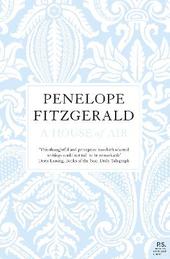
|
A House of Air
Paperback / softback
Main Details
| Title |
A House of Air
|
| Authors and Contributors |
By (author) Penelope Fitzgerald
|
|
Introduction by Hermione Lee
|
| Physical Properties |
| Format:Paperback / softback | | Pages:592 | | Dimensions(mm): Height 198,Width 129 |
|
| Category/Genre | Short stories |
|---|
| ISBN/Barcode |
9780007136438
|
| Classifications | Dewey:823.914 |
|---|
| Audience | |
|---|
|
Publishing Details |
| Publisher |
HarperCollins Publishers
|
| Imprint |
HarperPerennial
|
| Publication Date |
7 November 2005 |
| Publication Country |
United Kingdom
|
Description
WITH AN INTRODUCTION BY HERMIONE LEE The previously uncollected occasional prose of a great English writer - full of wit, feeling and illumination. Penelope Fitzgerald was a prolific letter writer. She avoided the phone if she could, never even contemplated the possibility of going online. Her warmth, humour and supreme storytelling abilities found their best forum here. Surprising, wonderfully funny, definitive, this is a major collection of Penelope Fitzgerald's reviews, essays and autobiographical writings. This collection includes pieces on contemporary novelists Giles Foden, Anne Enright, Carol Shields, Rose Tremain, Roddy Doyle; on classic writers Muriel Spark, A.E. Housman, Rose Macaulay, M.R. James, Stevie Smith, Dorothy L. Sayers; on remembering her grandfather E.H. Shepard; on her love of Devon and Spain and William Morris: on writers in their old age; and witty and poignant recollections of her schooldays, her life on a Thames barge, her childhood in Hampstead and the ghost who lived next door but one. This is a fantastically funny book - as much of an entertainment as the Kingsley Amis letters.
Author Biography
Penelope Fitzgerald was one of the most elegant and distinctive voices in British fiction. Three of her novels, The Bookshop, The Beginning of Spring and The Gate of Angels have been shortlisted for the Booker Prize. She won the Prize in 1979 for Offshore. Her last novel, The Blue Flower, was the most admired novel of 1995, chosen no fewer than nineteen times in the press as the 'Book of the Year'. It won America's National Book Critics' Circle Award. She died in April 2000, at the age of eighty-three.
Reviews'Of all the novelists in English of the last quarter-century, Penelope Fitzgerald has the most unarguable claim on greatness.' Philip Hensher 'This generous selection of essays, reviews, introductions and other occasional writings proves yet again that stylistically, intellectually and morally Fitzgerald couldn't put a foot wrong if she'd tried. Hers is an impeccable and unique voice not just from another century but another world.' Michael Dibdin, Books of the Year, Daily Telegraph 'Remarkable. It is the range of her scholarship that impresses.' Doris Lessing, Books of the Year, Daily Telegraph 'An intelligent writer, superbly and unfailingly so. Wise and funny, with a dry wit allied to a great emotional sympathy.' Sunday Times 'Elegant, perceptive and humane.' Joanna Trollope, Books of the Year, Observer Fitzgerald, who died in 2000, was a very English novelist - quiet, restrained, precise. She admired those who eschewed "making too much of things," and her ideals were of the sort that, as she discerned, George Eliot esteemed: "work, steadiness, harmony, peace." The editors of this unusually intelligent and sensitively selected collection of her criticism have chosen mainly those pieces that explore the authors of the "books of her heart" - mostly minor, often overlooked writers who were, as she lovingly describes E. M. Delafield, "accurate, calm, and lucid," and who composed books that could be considered "somber" if they "were less witty, and less deceptively mild." Taken as a whole, Fitzgerald's pieces on Delafield, Sylvia Townsend Warner, the Punch writers, Mrs. Oliphant (who excelled at what she called the "tragi-farce," a form Fitzgerald clearly loved), J. L. Carr, and Barbara Pym define a writerly sensibility of which Fitzgerald herself was, sadly, among the last adherents. This book is worth its price just for Fitzgerald's spot-on description of Pym's mordant vision of the distance between the sexes: "If men are less than angels, Barbara Pym's men are less than men, not wanting much more than constant attention and comfort. Their theses must be typed ! endless dinners cooked, remarks listened to ! and the forces of nature and society combine to ensure, even in the 1980s, that they get these things. Women see through them clearly enough, but are drawn toward them by their own need and a compassion which is entirely taken for granted."' Benjamin Schwartz, The Atlantic
|